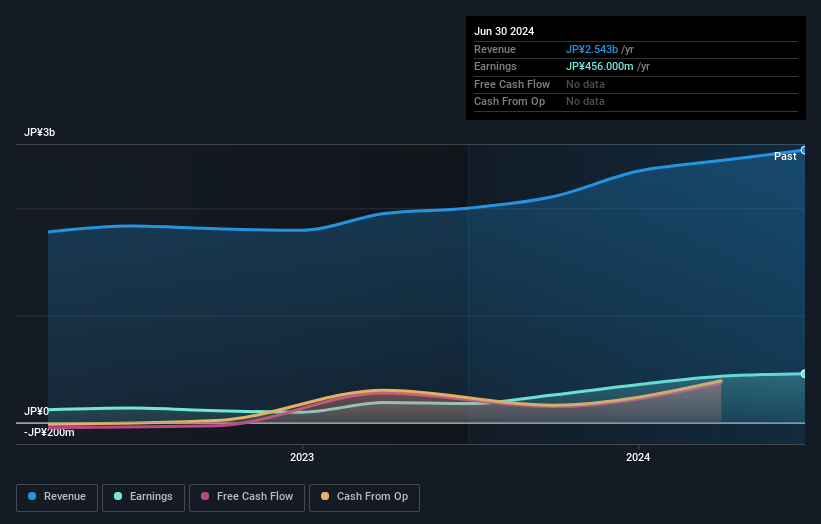Individual investors among FFRI Security, Inc.'s (TSE:3692) largest stockholders and were hit after last week's 13% price drop

Key Insights
- The considerable ownership by individual investors in FFRI Security indicates that they collectively have a greater say in management and business strategy
- The top 6 shareholders own 50% of the company
- 48% of FFRI Security is held by insiders
A look at the shareholders of FFRI Security, Inc. (TSE:3692) can tell us which group is most powerful. And the group that holds the biggest piece of the pie are individual investors with 49% ownership. In other words, the group stands to gain the most (or lose the most) from their investment into the company.
While insiders, who own 48% shares weren’t spared from last week’s JP¥2.9b market cap drop, individual investors as a group suffered the maximum losses
Let's take a closer look to see what the different types of shareholders can tell us about FFRI Security.
Check out our latest analysis for FFRI Security

What Does The Institutional Ownership Tell Us About FFRI Security?
Many institutions measure their performance against an index that approximates the local market. So they usually pay more attention to companies that are included in major indices.
Since institutions own only a small portion of FFRI Security, many may not have spent much time considering the stock. But it's clear that some have; and they liked it enough to buy in. If the company is growing earnings, that may indicate that it is just beginning to catch the attention of these deep-pocketed investors. It is not uncommon to see a big share price rise if multiple institutional investors are trying to buy into a stock at the same time. So check out the historic earnings trajectory, below, but keep in mind it's the future that counts most.

We note that hedge funds don't have a meaningful investment in FFRI Security. The company's CEO Yuji Ukai is the largest shareholder with 25% of shares outstanding. Meanwhile, the second and third largest shareholders, hold 18% and 2.1%, of the shares outstanding, respectively. Interestingly, the second and third-largest shareholders also happen to be the Chief Technology Officer and Member of the Board of Directors, respectively. This once again signifies considerable insider ownership amongst the company's top shareholders.
We did some more digging and found that 6 of the top shareholders account for roughly 50% of the register, implying that along with larger shareholders, there are a few smaller shareholders, thereby balancing out each others interests somewhat.
While studying institutional ownership for a company can add value to your research, it is also a good practice to research analyst recommendations to get a deeper understand of a stock's expected performance. As far as we can tell there isn't analyst coverage of the company, so it is probably flying under the radar.
Insider Ownership Of FFRI Security
The definition of an insider can differ slightly between different countries, but members of the board of directors always count. Company management run the business, but the CEO will answer to the board, even if he or she is a member of it.
I generally consider insider ownership to be a good thing. However, on some occasions it makes it more difficult for other shareholders to hold the board accountable for decisions.
Our information suggests that insiders maintain a significant holding in FFRI Security, Inc.. Insiders own JP¥8.9b worth of shares in the JP¥18b company. This may suggest that the founders still own a lot of shares. You can click here to see if they have been buying or selling.
General Public Ownership
With a 49% ownership, the general public, mostly comprising of individual investors, have some degree of sway over FFRI Security. This size of ownership, while considerable, may not be enough to change company policy if the decision is not in sync with other large shareholders.
Next Steps:
It's always worth thinking about the different groups who own shares in a company. But to understand FFRI Security better, we need to consider many other factors. Case in point: We've spotted 1 warning sign for FFRI Security you should be aware of.
Of course, you might find a fantastic investment by looking elsewhere. So take a peek at this free list of interesting companies.
NB: Figures in this article are calculated using data from the last twelve months, which refer to the 12-month period ending on the last date of the month the financial statement is dated. This may not be consistent with full year annual report figures.
New: AI Stock Screener & Alerts
Our new AI Stock Screener scans the market every day to uncover opportunities.
• Dividend Powerhouses (3%+ Yield)
• Undervalued Small Caps with Insider Buying
• High growth Tech and AI Companies
Or build your own from over 50 metrics.
Have feedback on this article? Concerned about the content? Get in touch with us directly. Alternatively, email editorial-team (at) simplywallst.com.
This article by Simply Wall St is general in nature. We provide commentary based on historical data and analyst forecasts only using an unbiased methodology and our articles are not intended to be financial advice. It does not constitute a recommendation to buy or sell any stock, and does not take account of your objectives, or your financial situation. We aim to bring you long-term focused analysis driven by fundamental data. Note that our analysis may not factor in the latest price-sensitive company announcements or qualitative material. Simply Wall St has no position in any stocks mentioned.
About TSE:3692
FFRI Security
Engages in research and consulting related to computer security products in Japan.
Flawless balance sheet with solid track record.


